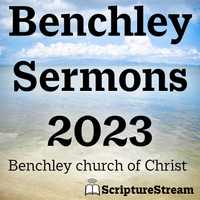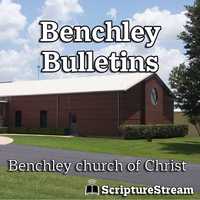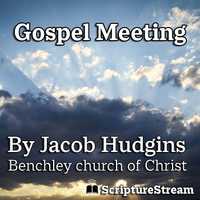In the beginning of the gospel, each congregation was independent (Acts 20:28; 1 Peter 5:1-3). Each local church did oversee its own functions without either turning part of its work over to another oversight or trying to get the oversight of part of the work of another church. But soon, brethren decided the Lord’s way was not doing well enough and started centralizing part of the work of local churches under a single oversight. Ultimately, the outgrowth of that mistake was the Roman Catholic Church. That movement led most local churches into apostasy. Then about 170 years ago brethren again decided that the Lord’s way was not sufficient. Alexander Campbell stated that experience had proved that the local church was not sufficient to get the work done. He should have been looking for Bible authority for his missionary society instead of thinking experience was authority for it. Thus, they again turned to centralization of local churches to do part of their work under a single oversight. The result was the American Christian Missionary Society. Again, that resulted in most local churches going into apostasy. Brethren did a lot of preaching against mechanical instruments of music in the worship of God, but virtually none about centralization. Then about 65 years ago brethren decided that the Lord’s way was not sufficient. Thus, they again turned to centralization of local churches to do part of their work under a single oversight. The result was benevolent organizations for benevolent work and sponsoring churches for missionary work. And again, most local churches went into apostasy. All this should show every Christian that it is man’s way that does not get the work done, not the Lord’s way. It does seem that after all this, any arrangement for God’s people to form any kind of central oversight to oversee the work the Lord assigned to local churches brings disaster to souls. But again, not much teaching about congregational independence has been done in the last 30 years. And again, many are turning to man-made centralized arrangements to oversee work that the Lord specified the local church to do. The only way congregational independence can be maintained is for every generation to be taught.
Congregational Independence is Scriptural
Acts 2 records the beginning of the Lord’s church. Members continued steadfastly in the apostles’ doctrine (Acts 2:42). Saved people in Jerusalem made up the Lord’s first local church. This was overseen by the apostles. When qualified men were available, elders were appointed (Acts 11:30). When other local churches started, and when qualified men were available, elders were appointed to oversee the functions of the local church (Titus 1:5; Acts 14:23). God’s specified structure is an arrangement for saved people in a locality to agree to work together under a common oversight and pool resources to finance the work assigned by the Lord. Then, when a plurality of men are qualified, they appoint elders and deacons. Thus, at that point, a local church consists of saints, elders, and deacons (Philippians 1: 1). Each member is to be a teacher (Acts 8:4). New Testament organization stops with the local church. There is not one word about two or more local churches functioning under common oversight to do anything. There is not one word about a mass meeting of churches in an area. There is not one word about representatives appointed to attend any sort of a general meeting of local churches. Not one word about individual Christians forming some structure for the work the Lord.
The same thing is wrong with local churches functioning under a common oversight as with the mechanical instrument in worship. Simply put, there is no authority for it. “According as his divine power hath given unto us all things that pertain unto life and godliness, through the knowledge of him that hath called us to glory and virtue” (2 Peter 1:3).
Congregational Independence is Effective
The gospel was preached to world in about 30 years (Colossians 1:23). This was done by local churches and individual Christians sounding forth the Word. It was done without any central oversight arrangement. Local churches supported preachers to preach the word (Philippians 4:15-16). Individuals taught the word everywhere they went (Acts 8:4). Man’s failure has not been a lack of organization but a failure to use that which the Lord provided. Individuals still move all over the country, but too many times they do not go preaching the word. Individual evangelism is most effective. It is practical, effective, inexpensive, and scriptural. Failure on the part of individuals to do this work is the greatest hindrance to the Cause. There is not a word about one congregation sending funds to another congregation to support a preacher. Each congregation is to select the preacher and give him wages (Philippians 4:15-16; 2 Corinthians 11:8). This is true whether the support is at home or elsewhere.
Congregational independence is also in benevolence. The local church administers relief to its own needy (Acts 4:34). One local church sends funds to overseers of needy churches so they can administer relief to their own (Acts 11:27-30). Several churches send funds to one church so it can administer relief to its own (1 Corinthians 6:1-2; Romans 15:25-32; 2 Corinthians 8; 9). All this was done without centralization of funds to be administered by common oversight. To set congregational independence aside for some human arrangement is to reject God.
Congregational independence is a safety measure. As long as it is maintained, no other church is affected when one strays. In central arrangement of churches, when the receiving and overseeing church goes into error, every church in the central arrangement either goes into error or gets out of the unscriptural arrangement.
There is no stopping place beyond congregational independence. If one church can use some of the money of other churches to preach the gospel, it can use all the money of all churches to preach the gospel. This is exactly the roman Catholic Church’s concept. When one feels unconstrained by scriptural dictates concerning the work of the local church, the only constraints that remain to hold one back from conforming to Roman Catholicism are prejudice and the opinion of man.
Jesse G. Jenkins


